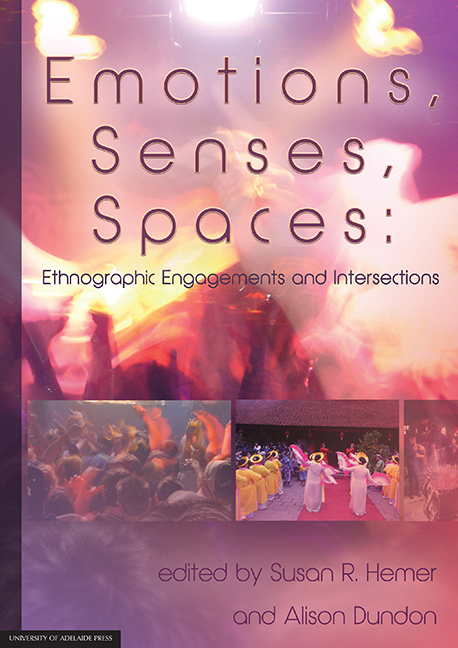Book contents
- Frontmatter
- Contents
- Biographies
- 1 Ethnographic intersections: Emotions, senses and spaces
- 2 ‘Dancing for joy’: Gender and relational spaces in Papua New Guinea
- 3 Creating the right ‘vibe’: Exploring the utilisation of space at Hip Hop concerts in Adelaide and Melbourne
- 4 Pontic dance: Feeling the absence of homeland
- 5 Emotional actors/Affective agents: Interspecies edgework and sociotechnical networks in the Spanish bullfight from horseback (rejoneo)
- 6 Sensual feasting: Transforming spaces and emotions in Lihir
- 7 Anxious spaces: The intersection of sexuality, the senses and emotion in fieldwork in Nepal
- 8 Interrupted research: Emotions, senses and social space in (and out of) the field
- 9 Voices in the park: The composition of sacred space and public place
- 10 Ngadha being-in-common: Emotional attachment to people and place in Flores, Indonesia
- 11 Trust your senses: Growing wine and making place in McLaren Vale
6 - Sensual feasting: Transforming spaces and emotions in Lihir
Published online by Cambridge University Press: 25 July 2017
- Frontmatter
- Contents
- Biographies
- 1 Ethnographic intersections: Emotions, senses and spaces
- 2 ‘Dancing for joy’: Gender and relational spaces in Papua New Guinea
- 3 Creating the right ‘vibe’: Exploring the utilisation of space at Hip Hop concerts in Adelaide and Melbourne
- 4 Pontic dance: Feeling the absence of homeland
- 5 Emotional actors/Affective agents: Interspecies edgework and sociotechnical networks in the Spanish bullfight from horseback (rejoneo)
- 6 Sensual feasting: Transforming spaces and emotions in Lihir
- 7 Anxious spaces: The intersection of sexuality, the senses and emotion in fieldwork in Nepal
- 8 Interrupted research: Emotions, senses and social space in (and out of) the field
- 9 Voices in the park: The composition of sacred space and public place
- 10 Ngadha being-in-common: Emotional attachment to people and place in Flores, Indonesia
- 11 Trust your senses: Growing wine and making place in McLaren Vale
Summary
Abstract
This chapter explores how shifts between differing emotions are mediated spatially and sensually. Drawing on Hochschild's (1979) concepts of ‘feeling rules’ and ‘emotion work’, the chapter questions how spatial and sensual aspects of social events may evoke particular emotions and, in turn, how feeling rules for social situations may be transformed in the process. I focus on the case of events surrounding a project for women's development in Lihir, Papua New Guinea, in the early 2000s. One form of anger, a simmering withdrawal, was changed to open conflict following a large feast to mark the opening of a sewing centre. The sensuality of feasting, with its sounds, smells, tastes and crowds, allowed women to take ownership of the centre and of their right to openly express hostility. This case allows for critical reflection on the concept of feeling rules in a setting that places less emphasis on individual emotional management and more on social relatedness.
Introduction
In April 2002, the small boat harbour at Londolovit in Lihir, Papua New Guinea, came alive. Lihirian women took over the normally empty space with its yellow coronous road, green grass and large white metal building, and changed it into a bustling, noisy area. Thousands of people packed into the space to eat hot tubers and meaty pork, to watch dancers arrayed in neat lines moving to the sounds of beaten bamboo and kundu (hour glass) drums, to smell the scent of herbs adorning the dancers and hosts. They watched fashion parades with newly made garments and white wedding dresses, and listened to speeches by dignitaries and songs proclaiming women's togetherness.
This unprecedented event was planned and executed by Lihirian women's leaders to celebrate gaining their own space in Londolovit township. Yet this event was preceded by simmering conflict and followed by open conflict. In this chapter, I unravel this event through an understanding of its emotional, sensual and spatial dimensions. In doing so, I critically comment on the concepts of feeling rules and emotion work.
- Type
- Chapter
- Information
- Emotions, Senses, SpacesEthnographic Engagements and Intersections, pp. 91 - 106Publisher: The University of Adelaide PressPrint publication year: 2016

